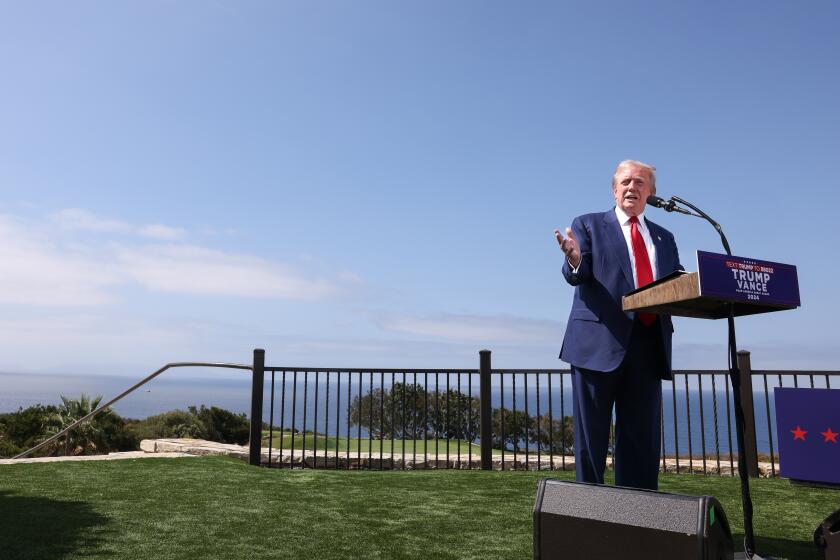Lawmakers Eager to Grill Oil Executives
Oil industry executives summoned to Capitol Hill are expected to receive a grilling Wednesday -- perhaps unlike any they have faced before -- over their record profits at a time of high oil prices.
But the questions won’t just be coming from the usual critics. Some of the industry’s traditional Republican allies are eager to demonstrate that they too share their constituents’ anger.
The hearing, ordered by Senate Majority Leader Bill Frist (R-Tenn.), illustrates the political pressure that is driving Republicans to make a show of getting tough on an industry that has been a major source of GOP cash. Beyond the Senate hearing, House Speaker J. Dennis Hastert (R-Ill.) is preparing to call oil company executives to a meeting to confront them on what they are doing to boost fuel supplies and bring down prices.
“Republicans are trying to get in front of this issue because it is clearly an anchor around their ankles at the moment,” said Marshall Wittmann, a former Senate Republican aide now with the centrist Democratic Leadership Council. “There’s no doubt that the high gasoline prices are contributing to the low popularity numbers of both the president and the Republican Congress.”
Lee Raymond, chairman and chief executive of ExxonMobil Corp., which posted a $9.9-billion third-quarter profit -- up 75% from a year earlier -- is among those scheduled to testify at the joint hearing Wednesday before the Senate Commerce and Energy committees.
Also scheduled to appear are Chevron Chairman and Chief Executive David O’Reilly; ConocoPhillips Chairman and Chief Executive James Mulva; Ross Pillari, president and chief executive of BP America Inc.; and Shell Oil Co. President John Hofmeister.
It is unclear whether the hearing will produce legislation, but oil industry profits already have generated unusual demands from Republicans.
One Republican, Sen. Judd Gregg of New Hampshire, has joined Democrats in calling on Congress to consider a windfall profits tax. Another Republican, Sen. Charles E. Grassley of Iowa, wants to challenge industry executives to donate 10% of their profits toward home-heating subsidies for low-income families. Grassley does not serve on the committees that will hear from the oil industry but plans to ask colleagues who sit on the panels to relay his proposal.
Sen. Larry E. Craig (R-Idaho) said that Grassley’s proposal might be a good idea for an industry “looking for some good PR at this moment.”
Lawmakers “clearly want some explanation” for the industry’s recent boost in profits, “and if those explanations are not satisfactory, they’ll do something about that,” said GOP pollster David Winston. For example, he said, lawmakers could consider rescinding tax breaks provided in a big energy bill passed this year or could order audits of oil company books.
Wittmann doubted that the Republican-controlled Congress would impose a windfall profits tax. “It’s very unlikely that a Republican Congress will actually pass legislation that has teeth that will bite some of their largest contributors,” he said.
The oil and gas industry was a major source of campaign funds for Republican congressional candidates, contributing $13.3 million in the 2004 election cycle, said the Center for Responsive Politics, a campaign finance watchdog. Democratic congressional candidates received about $3.3 million.
Pump prices have eased from their highs reached after Hurricane Katrina, according to AAA’s daily price survey. Self-serve regular had reached $3.057 a gallon on Labor Day; the U.S. average Monday was $2.383 a gallon, AAA reported.
Still, lawmakers from both parties -- especially from cold-weather states in the Northeast and Midwest -- are getting an earful about gasoline prices. They are bracing for more political fallout through the winter because of projected increases in home heating bills.
Democrats also have sought to make energy prices a campaign issue heading into next year’s congressional elections.
“What we need to be doing is not having hearings that make it look like we’re doing something,” said Barry Piatt, a spokesman for Sen. Byron L. Dorgan (D-N.D.). “We need to be doing something.”
Dorgan has proposed a 50% tax on the portion of the price of oil that exceeds $40 a barrel. The proceeds would go toward a rebate for consumers.
Frist said he wanted executives to explain why prices were high when the companies were enjoying record profits. “The question that our constituents ask, and we ask, is why?” he said.
The executives are expected to explain what they are doing to increase fuel supplies, as well as contrast their profits with those of other industries. The oil industry has said that its profits are cyclical and not out of proportion to that of other industries when measured over several years. In addition, oil companies say, energy exploration requires large investments that would not be possible if the companies were not making money.
Jeff Eshelman of the Independent Petroleum Assn. of America said that “the industry will need to explain that we are doing everything possible to rebuild after the hurricanes and reinvest in new supplies.”
But, he added, “Congress must do no harm and should not take any actions that would further restrict new supplies of domestic oil and natural gas.”
An ExxonMobil spokesman declined to discuss its chairman’s testimony in advance of the hearing. But spokesman Dave Gardner said that “the best thing that the government can do is to let the market work.”
The Federal Trade Commission chairman and state attorneys general also will appear before the committees. They are expected to testify on the effectiveness of state anti-price-gouging laws. Legislation has been proposed to create a federal anti-gouging law.
More to Read
Get the L.A. Times Politics newsletter
Deeply reported insights into legislation, politics and policy from Sacramento, Washington and beyond. In your inbox three times per week.
You may occasionally receive promotional content from the Los Angeles Times.











